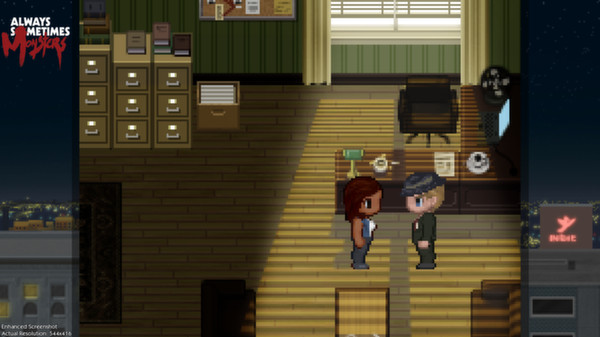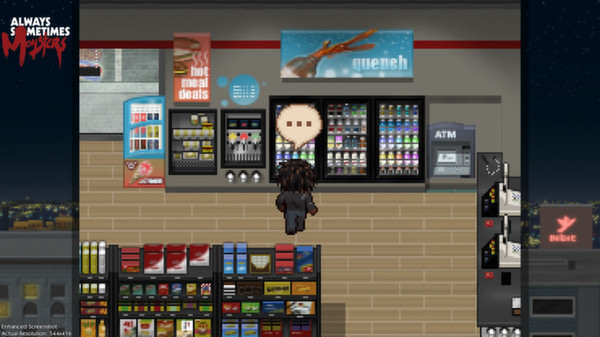A never-ending quest to save my ex-girlfriend.
Choice is a strange narrative mechanic in gaming. Due to programming and budgetary limitations, the impact and the importance of choices you make can sometimes underwhelm. Either you're given the option of doing something recognizably good or evil, or your story just trudges along without showing the impact of your decisions. I'm happy to let you know that Always Sometimes Monsters avoids these common problems and has some tricks up its sleeve as well.
During character selection, masked as a grand party thrown by your publisher, I chose a Latino player character who always wears a brown hoodie and my love interest looked more or less like a white accountant. The folks I didn't choose appeared as NPCs through the course of the story which was a smart way to avoid the existential problem of Schrödinger's Player Character, but this is only the beginning.
Players have 30 days to get to their ex-lover's wedding, and whether you watch or object, the only objective made clear is that you've got to get there. However, since you've got no money and no place to stay, the adventure has a rocky start. Visiting the various places around Dubtown, where you begin, provides options for making money including theft. One of the first ways I made some dough was swindling a club girl out of cash she gave me to score some E. Of course, you need money but you're also stealing. Then again, if you don't give her drugs you choose not to participate in something that may or may not end her life.
As small as that moment is, it's an example of how complex decisions present themselves in the game. It is rarely a choice between being nice or being a jerk and the morally grey approach the developers took actually forced me to think for a moment: "Wait… what would I do if it were me?" There's no easy way to be morally consistent, and you'll begin some narrative events innocently enough only to have to make tough decisions later on.
The graphics feature the kind of chibi-style sprites you'd find in old JRPGs, only slightly more refined. However, the result is a bit duplicitous. On one hand, you're performing serious adult actions with serious adult consequences but they can seem minimized by the cute visuals at times. On the other, it feels like there's a greater commentary on gaming made through these sprites.
We are inherently molded into believing that it is only through hyper-realism that an adult story can be told, but realistically rendered graphics are often used for ignorable pulp such as Far Cry 3. Through these graphics, our expectations are offset to allow for childish pictures to convey mature themes, creating a jarring but thought-provoking juxtaposition. Thankfully the music feels timeless with an '80s influence, always fun and fascinating when coupled with the visuals and the narrative.
Throughout the 9-10-hour journey, I was presented with a handful of mini-games to go about my daily actions. There's boxing which involves reading your opponent's actions and queuing all of your moves to counteract his. Hacking is done via Frogger-style interface. You'll even prepare weed shipments by trying to accurately maximize plant clippings. Even with all the ways the gameplay is changed up during the course of the story, there are also arcades and game consoles that allow players to try out odd revamps of classics like Pac-Man. I appreciated these elements because they elevate the experience above mere visual novel.
The last quarter of Always Sometimes Monsters felt like there was less going on and one element confused me as it became less important: As time progresses your character will gain and typically lose stamina. The only way to refill this meter is to feed him or her, which is monetarily prohibitive depending on how you've been doing with jobs and spending. However, I was able to carry on a number of days with zero stamina and the final stage doesn't offer a chance to purchase food, ensuring a depleted bar. I didn't witness any outcome, positive or negative, as a result of this so either the meter is particularly esoteric or it's a needless feature, both of which seem odd.
If you're inclined to play a mature game with mature decision-making, I do highly recommend Always Sometimes Monsters. The game smartly tests how effectively you choices play out in the final act, something I don't wish to spoil but Vagabond Dogs deserves praise for. Whether the graphics do it for you or not, it is worth seeing how your story plays out as you've tailored it… and it's definitely worth playing all over again to see how things change.
Bonus: You can play it with one hand! (Use the number pad.)
-
Great morally grey decision making
-
Fantastic twist on morality games waiting in final act
-
Compelling soundtrack with slight 80s influence
-
Meaningless stamina bar (?)
-
Chibi-style sprites
-
Plenty of mini-games and references to old arcade games
Always Sometimes Monsters
-
Always Sometimes Monsters #1

-
Always Sometimes Monsters #2

-
Always Sometimes Monsters #3

-
Always Sometimes Monsters #4

-
Always Sometimes Monsters #5

-
Always Sometimes Monsters #6








